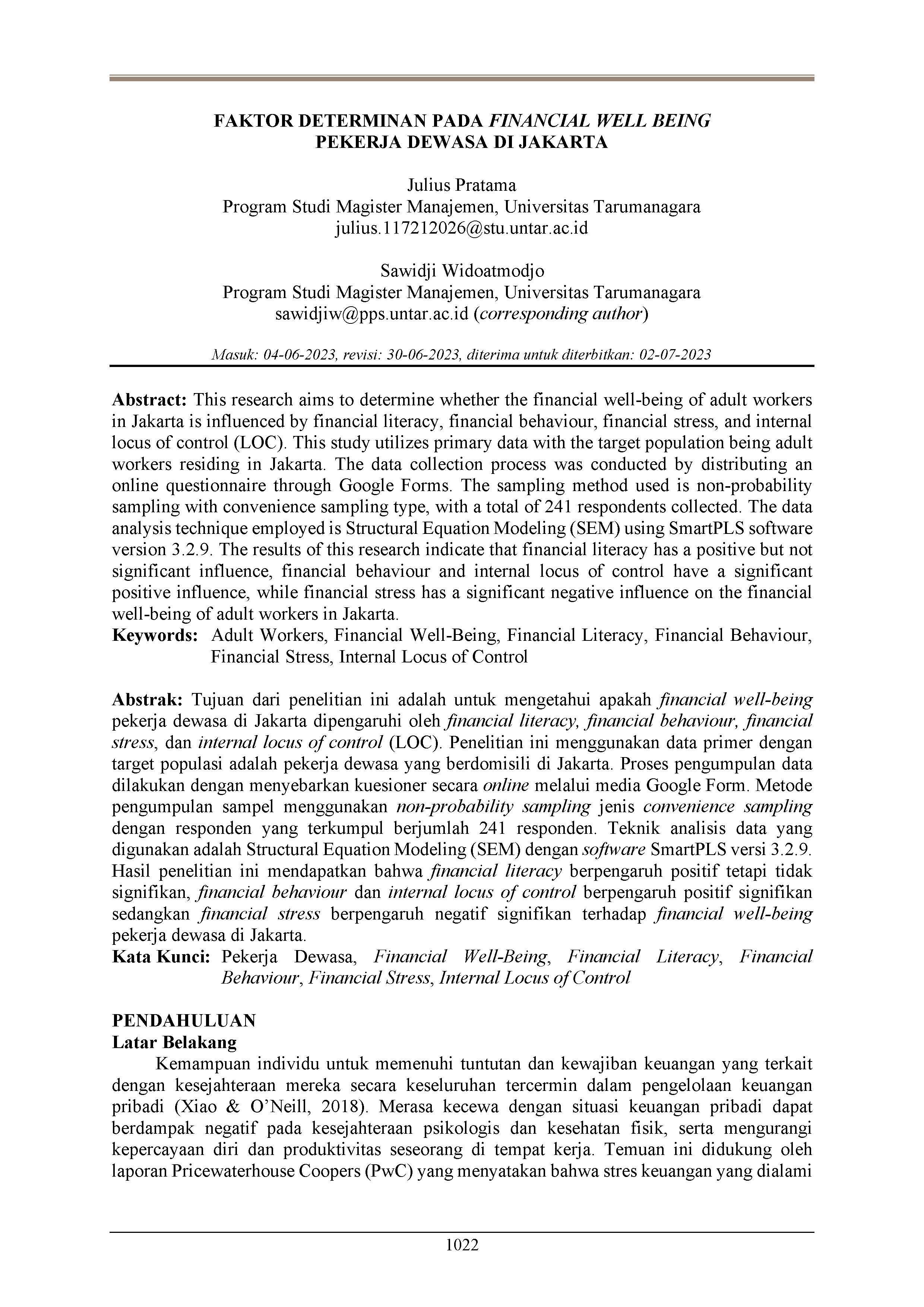Faktor determinan pada financial well being pekerja dewasa di Jakarta
Main Article Content
Abstract
This research aims to determine whether the financial well-being of adult workers in Jakarta is influenced by financial literacy, financial behaviour, financial stress, and internal locus of control (LOC). This study utilizes primary data with the target population being adult workers residing in Jakarta. The data collection process was conducted by distributing an online questionnaire through Google Forms. The sampling method used is non-probability sampling with convenience sampling type, with a total of 241 respondents collected. The data analysis technique employed is Structural Equation Modeling (SEM) using SmartPLS software version 3.2.9. The results of this research indicate that financial literacy has a positive but not significant influence, financial behaviour and internal locus of control have a significant positive influence, while financial stress has a significant negative influence on the financial well-being of adult workers in Jakarta.
Tujuan dari penelitian ini adalah untuk mengetahui apakah financial well-being pekerja dewasa di Jakarta dipengaruhi oleh financial literacy, financial behaviour, financial stress, dan internal locus of control (LOC). Penelitian ini menggunakan data primer dengan target populasi adalah pekerja dewasa yang berdomisili di Jakarta. Proses pengumpulan data dilakukan dengan menyebarkan kuesioner secara online melalui media Google Form. Metode pengumpulan sampel menggunakan non-probability sampling jenis convenience sampling dengan responden yang terkumpul berjumlah 241 responden. Teknik analisis data yang digunakan adalah Structural Equation Modeling (SEM) dengan software SmartPLS versi 3.2.9. Hasil penelitian ini mendapatkan bahwa financial literacy berpengaruh positif tetapi tidak signifikan, financial behaviour dan internal locus of control berpengaruh positif signifikan sedangkan financial stress berpengaruh negatif signifikan terhadap financial well-being pekerja dewasa di Jakarta.
Article Details

This work is licensed under a Creative Commons Attribution-NonCommercial-ShareAlike 4.0 International License.
This work is licensed under a Jurnal Manajemen Bisnis dan Kewirausahaan Creative Commons Attribution-ShareAlike 4.0 International License.
References
Adam, A. M., Frimpong, S., & Boadu, M. O. (2017). Financial literacy and financial planning: Implication for financial well-being of retirees. Business and Economic Horizons, 13(2), 224–236. https://doi.org/10.15208/beh.2017.17
Ajzen, I. (1991). The theory of planned behavior. Organizational Behavior and Human Decision Processes, 50(2), 179–211. https://doi.org/10.1016/0749-5978(91)90020-T
Badan Pusat Statistik. (2022). Rata-rata upah/gaji (rupiah), 2019-2021. https://www.bps.go.id/indicator/19/1521/1/rata-rata-upah-gaji.html
Badan Pusat Statistik DKI Jakarta. (2022). Rata-rata pengeluaran per kapita sebulan makanan dan bukan makanan di daerah perkotaan menurut kabupaten/kota (rupiah) 2017-2019. https://jakarta.bps.go.id/indicator/5/136/2/rata-rata-pengeluaran-per-kapita-sebulan-makanan-dan-bukan-makanan-di-daerah-perkotaan-menurut-kabupaten-kota-rupiah-.html
Brüggen, E. C., Hogreve, J., Holmlund, M., Kabadayi, S., & Löfgren, M. (2017). Financial well-being: A conceptualization and research agenda. Journal of Business Research, 79, 228–237. https://doi.org/10.1016/j.jbusres.2017.03.013
Chu, Z., Wang, Z., Xiao, J. J., & Zhang, W. (2017). Financial literacy, portfolio choice and financial well-being. Social Indicators Research, 132(2), 799–820. https://doi.org/10.1007/s11205-016-1309-2
Cobb-Clark, D. A., Kassenboehmer, S. C., & Sinning, M. G. (2016). Locus of control and savings. Journal of Banking and Finance, 73, 113–130. https://doi.org/10.1016/j.jbankfin.2016.06.013
Consumer Financial Protection Bureau. (2015). Financial well-being: The goal of financial education. https://files.consumerfinance.gov/f/201501_cfpb_report_financial-well-being.pdf
Iramani, R., & Lutfi, L. (2021). An integrated model of financial well-being: The role of financial behavior. Accounting, 7(3), 691–700. https://doi.org/10.5267/j.ac.2020.12.007
Kemenko PMK. (2022, October 27). Menko PMK: Para pekerja sangat strategis ciptakan nilai tambah ekonomi. kemenkopmk.go.id. https://www.kemenkopmk.go.id/menko-pmk-para-pekerja-sangat-strategis-ciptakan-nilai-tambah-ekonomi
Lavonda, P., Setyawan, I. R., & Ekadjadja, M. (2021). Determinants of financial well-being among young workers in Jakarta during the covid-19 pandemic. Jurnal Ekonomi, 26(2), 305–320. https://doi.org/10.24912/je.v26i2.752
Luis, L., & MN, N. (2020). Pengaruh pengendalian diri, literasi serta perilaku keuangan terhadap kesejahteraan keuangan. Jurnal Manajerial dan Kewirausahaan, 2(4), 994–1004. https://doi.org/10.24912/jmk.v2i4.9883
Magli, A. S., Sabri, M. F., Abdul Rahim, H., & Othman, M. A. (2021). Influence of financial behavior, financial stress and locus of control on financial well-being among B40 households in Selangor during the pandemic. International Journal of Academic Research in Business and Social Sciences, 11(12), 467–486. https://doi.org/10.6007/ijarbss/v11-i12/11792
Mahdzan, N. S., Zainudin, R., Sukor, M. E. A., Zainir, F., & Wan Ahmad, W. M. (2019). Determinants of subjective financial well-being across three different household income groups in Malaysia. Social Indicators Research, 146(3), 699–726. https://doi.org/10.1007/s11205-019-02138-4
Perry, V. G., & Morris, M. D. (2005). Who is in control? The role of self-perception, knowledge, and income in explaining consumer financial behavior. Journal of Consumer Affairs, 39(2), 299–313. https://doi.org/10.1111/j.1745-6606.2005.00016.x
PwC. (2017). Special report: Financial stress and the bottom line. https://resources.salaryfinance.com/hubfs/PwC Financial Education Report: Financial stress and the bottom line.pdf
Rahman, M., Isa, C. R., Masud, M. M., Sarker, M., & Chowdhury, N. T. (2021). The role of financial behaviour, financial literacy, and financial stress in explaining the financial well-being of B40 group in Malaysia. Future Business Journal, 7(1), 52. https://doi.org/10.1186/s43093-021-00099-0
Rotter, J. B. (1966). Generalized expectancies for internal versus external control of reinforcement. Psychological Monographs, 80(1), 1–28. https://doi.org/10.1037/h0092976
Selvia, G., Rahmayanti, D., Afandy, C., & Zoraya, I. (2021). The effect of financial knowledge, financial behavior and financial inclusion on financial well-being. Proceedings of the 3rd Beehive International Social Innovation Conference, BISIC 2020, 3-4 October 2020, Bengkulu, Indonesia. https://doi.org/10.4108/eai.3-10-2020.2306600
She, L., Rasiah, R., Turner, J. J., Guptan, V., & Sharif Nia, H. (2022). Psychological beliefs and financial well-being among working adults: The mediating role of financial behaviour. International Journal of Social Economics, 49(2), 190–209. https://doi.org/10.1108/IJSE-07-2021-0389
Strömbäck, C., Lind, T., Skagerlund, K., Västfjäll, D., & Tinghög, G. (2017). Does self-control predict financial behavior and financial well-being? Journal of Behavioral and Experimental Finance, 14, 30–38. https://doi.org/10.1016/j.jbef.2017.04.002
Xiao, J. J. (2008). Applying behavior theories to financial behavior. In Handbook of Consumer Finance Research (pp. 69–81). Springer New York. https://doi.org/10.1007/978-0-387-75734-6_5
Xiao, J. J., & O’Neill, B. (2018). Propensity to plan, financial capability, and financial satisfaction. International Journal of Consumer Studies, 42(5), 501–512. https://doi.org/10.1111/ijcs.12461
Yushita, A. N. (2017). Pentingnya literasi keuangan bagi pengelolaan keuangan pribadi. Nominal, Barometer Riset Akuntansi dan Manajemen, 6(1), 11–26. https://doi.org/10.21831/nominal.v6i1.14330


